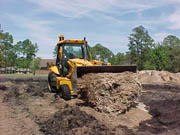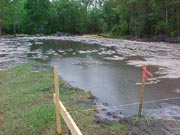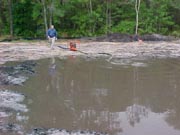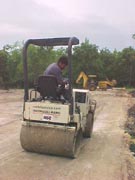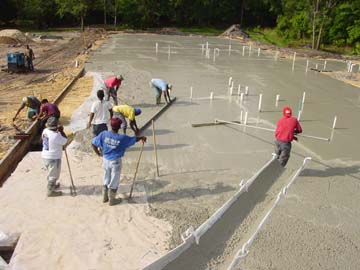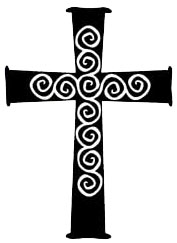|
The Rev. Frank
Logue
It’s All About Me (Again) I need to own something up front. When I read this passage from Matthew’s Gospel, I can’t help but think, “It’s all about me.” I know that sounds conceited, but it’s what I think. Jesus says a foolish man built his house on sand then “The rain fell, and the floods came, and the winds blew and beat against that house, and it fell—and great was its fall!”
So you see. I hear this reading and feel like it is all about me. But, of course, there is more going on here. It begins with some tough words from our savior. Jesus says, “Not everyone who says to me, ‘Lord, Lord,’ will enter the kingdom of heaven, but only the one who does the will of my Father in heaven. On that day many will say to me, ‘Lord, Lord, did we not prophesy in your name, and cast out demons in your name, and do many deeds of power in your name?’ Then I will declare to them, ‘I never knew you; go away from me, you evildoers.’” Tough words. Jesus says that they’ll be people who knew of him without really knowing him and in the coming judgment; those people will also be among those Jesus sends away. Real fire and brimstone stuff and if it were my way with God’s word, I could really get the fires of Hell stoked up this morning in a sermon warning that some of you are going to Hell if you don’t straighten out your lives. I have quoted this passage before from the great Christian writer C.S. Lewis as I feel it captures well my own understanding of judgment at the end of time. He wrote, “Some will not be redeemed. There is no doctrine I would more willingly remove from Christianity than this, if it lay in my power. But it has the full support of Scripture and, specially, of our Lord’s own words; it has always been held by Christendom; and it has the support of reason. If a game is played, it must be possible to lose it. If the happiness of a creature lies in self-surrender, no one can make that creature surrender but himself.”[1] God can offer grace an infinite number of times, but we still have the option to accept or to decline. There will be those who sat in church and know all about God, who never came into a relationship with him. Jesus warns they won’t make the cut. It is only then that Jesus tells the parable of two men building there houses, one on the rock, the other on the sand. The weather patterns of Israel make this illustration even more pointed. Much of Israel is desert and gets its water for the year all at once in hammering rains, followed by drought. The country is lined with wadis, dry riverbeds that becoming rushing torrents after the rain. Erosion is a serious problem everywhere, but more so in a land where the rain comes mainly in floods. Building a house in Israel means not only first finding rock, but also digging down to get into the rock, clearing away the topsoil and debris. The point being that we are to make God the foundation of our lives. We are to clear away the other stuff that gets in the way of putting God first. Then when God is comes first and that relationship with God is our number one priority, Christ will make be the foundation of our lives. If I didn’t watch out, I could still use this text to rail against people who have built there house on the sand. I could try to dangle their souls over the flames of Hell to interest them in Heaven. And who would I rail against? People who aren’t good Christians just like me, of course. Notice the just like me. What other standard could I apply? That is the very opposite approach than what Jesus is teaching. For if we had read this passage in context, we would have heard the passage that came about twenty verses sooner when Jesus said, “Do not judge so that you will not be judged. For in the way you judge, you will be judged; and by your standard of measure, it will be measured to you. Why do you look at the speck that is in your brother’s eye, but do not notice the log that is in your own eye? Or how can you say to your brother, ‘Let me take the speck out of your eye,’ and behold, the log is in your own eye? You hypocrite, first take the log out of your own eye, and then you will see clearly to take the speck out of your brother’s eye.” (Matthew 7:1-6) Jesus first told those listening to him not to judge others but to judge themselves. Then he warned that not everyone who says “Lord, Lord” will enter the kingdom of heaven, but only those who do the will of God. And finally he told the parable about the house on the rock and the sand. I try to ask not just what a passage of scripture says, but to also ask, “What is it doing?” What this passage says is, “Not everyone will make it into heaven, but only those who do God’s will.” What the passage is doing is to call us to self examination and inward reflection. What it is not doing is calling me to go finding fault in others. After all, Jesus had just warned his followers not to judge others, but only themselves. You don’t have the perspective God has from which to judge others. You are the only person you know well enough to judge. At the coming judgment, you will not be held accountable for your neighbor’s faith. You will, however, be held accountable for loving your neighbor as yourself. That does not give you an excuse to judge them. It’s a call to love them. I want to share two sayings with you from the desert fathers. These are hermits of the fourth century in Egypt whose sayings have been preserved. They tried to live a life radically conformed to the Gospel and I find there words sharp and to the point. Here are the two sayings, it helps to understand the second to know that an Abbot is the spiritual head of a community. An Elder said: Do not judge a fornicator if you are chaste, for if you do, you too are violating the law as much as he is. For He who said thou shalt not fornicate also said thou shalt not judge.
One of the brethren had sinned, and the priest told him to leave the community. So then Abbot Besarion got up and walked out with him, saying: I too am a sinner!” So, you see, when I read Matthew chapter 7 it’s not about you at all, it’s all about me. I am a sinner and this passage is Jesus calling me to look at the foundations of my life. What are my priorities? Where do I put my faith? For me to stand and rail against you would be to fuss at a group of people with specks of dust in their eyes while I stand here with a beam in my own. And when you read these words, the same thing is true. For whoever reads Matthew chapter 7 is to look to their own life and say, “This is all about me.” Then you can pray to your loving Lord who warns you because he loves you, and say, “Lord what would you have me to change.” It’s in that one-on-one with God, opening yourself up to God showing you the error in your own life that real change can occur. Whenever we try to do God’s work by judging someone else we step into sin. We are called to ask the Holy Spirit to guide us in judging ourselves as we reach out in love to others, leaving their judgment to God. Amen. [1] C.S. Lewis, The Problem of Pain (New York: Simon & Schuster, 1962), p. 105-106.
|

